ABC launched The River with a deal of hype, possibly because Spielberg has put his name on the project as an Executive Producer. It features lush scenery not often seen on series television and an ominous tone of supernatural horror hovers over it all. The triggering event for the series involves the mysterious disappearance of Dr. Emmet Cole (played by Bruce Greenwood), a world-famous explorer who for 20 years (or more) has brought the far corners of the world to television audiences. He’s been missing six months at the series’ start and his son Lincoln (Joe Anderson) has concluded his father (from whom he is estranged) is dead.
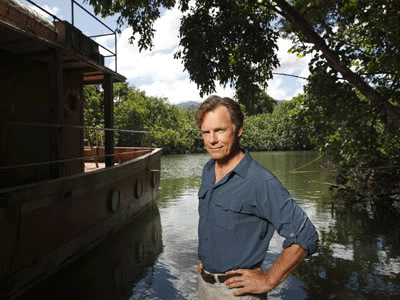 But a beacon signal has gone off at last and Lincoln’s mother Tess (Leslie Hope) wants to mount an expedition to go rescue Emmet. The catch is they have to take a film crew in order to fund this trip.
But a beacon signal has gone off at last and Lincoln’s mother Tess (Leslie Hope) wants to mount an expedition to go rescue Emmet. The catch is they have to take a film crew in order to fund this trip.
Okay, you say. Could be interesting. Mysterious Amazon setting, family quest, supernatural tales. All workable, right?
Well … not exactly.
In The Scribbler’s Guide to the Land of Myth, in discussing franchise storytelling, I present what I call the Constant Jeopardy Syndrome.
If the premise of the franchise involves a major problem for your main character (or characters), and if the overall story ends when the character solves the problem, you are dealing with the Constant Jeopardy Syndrome.
The River fits this template. There are certain problems that come from using the CJS as the frame for your stories. And already, after just three episodes, some of these problems are starting to surface.
First off, there is the set-up for the series. It isn’t just that a team of people are on a quest and if they find Emmet the stories “end.” It is that the show’s creators have committed the audience to the knowledge that what we are seeing is “found footage,” which implies the questers do not make it back.
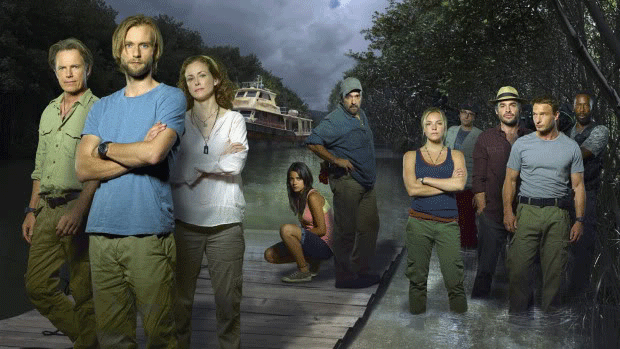 Obviously, the show’s storytellers want to make it a scary show. The “found footage” aspect implies disaster waiting ahead and we are to be anxious about the future of the characters. But this is where the problems of the Constant Jeopardy Syndrome come into play.
Obviously, the show’s storytellers want to make it a scary show. The “found footage” aspect implies disaster waiting ahead and we are to be anxious about the future of the characters. But this is where the problems of the Constant Jeopardy Syndrome come into play.
There’s the dangling carrot of Emmet Cole’s mysterious fate. Of course, we can’t have the questers find him very quickly. But he cannot be perpetually unattainable. At some point, the audience will want to see the questers’ perseverence rewarded in some fashion.
But say they do find Emmet? Does that necessarily put the story at an end?
Not exactly. As it happens, Emmet chose to lose himself in an “uncharted region” of the Amazon River Basin. The intrepid hunters are sailing up a tributary that is “not on any charts” (even though it does have a name). A storyteller could keep them lost in these mysterious regions where supernatural elements run free.
However, the show has a limited cast. There is no cannon fodder, there are no “redshirts.” In the first hour they killed off a couple of people to dramatize the threat the team is heading into — but now, three episodes in, they are pretty much set. This becomes a problem, in storytelling, keeping the audience hooked. The audience is outside the story. We know it is a series. In spite of the storytelling conceit of the “found footage” and its implications, we know the story “will go on.” For the characters, they believe they could die at any moment — they’ve seen it happen. But for the audience, we can guess that from this point on, none of the regulars will die. There’s no way to add in new characters, and we know this set are regulars.
The storytellers are working very hard to make this a scary show, tinged with horror. Emmet’s quest to find “the magic” out there sets the tone for this. The doctor’s dabbling with native supernatural phenomena gives the questers a lot to deal with as they go along.
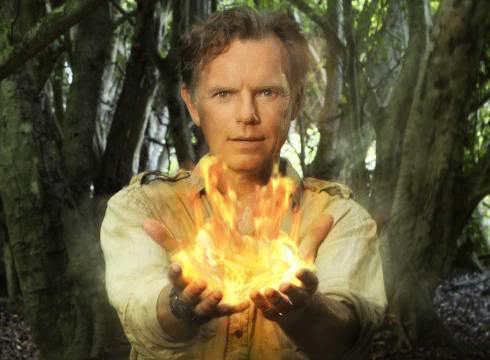 The show unfolds the backstories of the characters. But they come with plot-necessitated aspects, which means we will see some very specific behavior from each as the series progresses.
The show unfolds the backstories of the characters. But they come with plot-necessitated aspects, which means we will see some very specific behavior from each as the series progresses.
Son Lincoln is a big problem: he didn’t want to come on this quest. He was estranged from his father and has eschewed Emmet’s interests.
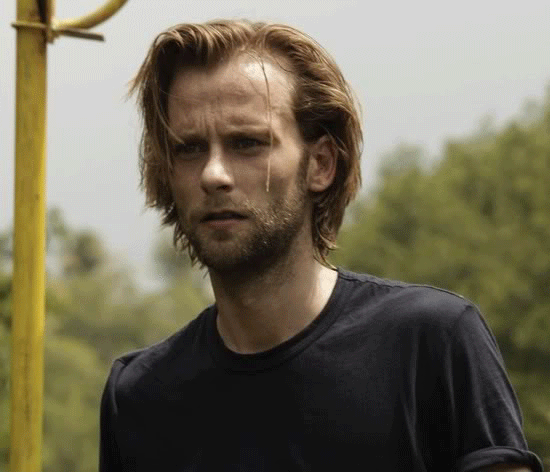 Lincoln has studied medicine, meaning he went in the opposite direction his father took pursuing magic. But the circumstances of the journey are forcing Lincoln to engage with Emmet’s quest. And already, in just three episodes there are implications that Lincoln is by nature the shaman his father wants to become.
Lincoln has studied medicine, meaning he went in the opposite direction his father took pursuing magic. But the circumstances of the journey are forcing Lincoln to engage with Emmet’s quest. And already, in just three episodes there are implications that Lincoln is by nature the shaman his father wants to become.
The “jobs” of each of the characters are already getting too entrenched. Tess, Emmet’s wife, drives the quest forward. We’re not entirely sure why, since Emmet went off on his quest without her.
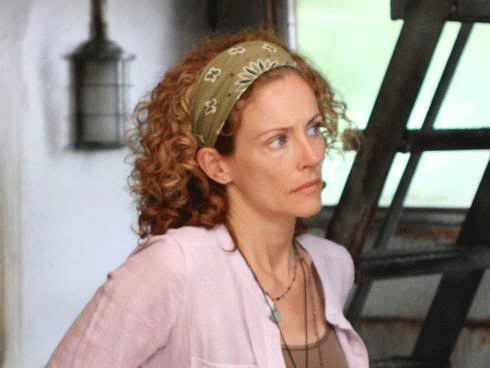 And then there is the young woman-child Jahel (played by Paulina Gaitan), who speaks only in Spanish although it is quite clear she fully comprehends English. She also seems to know all the names and lore of the supernatural things in this uncharted region.
And then there is the young woman-child Jahel (played by Paulina Gaitan), who speaks only in Spanish although it is quite clear she fully comprehends English. She also seems to know all the names and lore of the supernatural things in this uncharted region.
 The cameraman, AJ (Shaun Parkes) and their security man Captain Kurt Brynildson (Thomas Kretschmann) don’t really have an emotional investment in the quest. Well, except for the fact that Kurt has a satellite phone he uses to contact the outside world. And it would seem his hidden mission is to keep the questers and Emmet from finding “the Source.” Lena (Eloise Mumford) is looking for her father, the only close friend Emmet took with him. Lena is the techno-info encyclopedia for the series. She also seems to know far more about Emmet’s recent choices than his family do. Jahel’s father (Daniel Zacapa) keeps things running. And then there is Clark (Paul Blackthorne), the producer, a long friend of Emmet’s and laboring under an apparently unrequited love for Tess.
The cameraman, AJ (Shaun Parkes) and their security man Captain Kurt Brynildson (Thomas Kretschmann) don’t really have an emotional investment in the quest. Well, except for the fact that Kurt has a satellite phone he uses to contact the outside world. And it would seem his hidden mission is to keep the questers and Emmet from finding “the Source.” Lena (Eloise Mumford) is looking for her father, the only close friend Emmet took with him. Lena is the techno-info encyclopedia for the series. She also seems to know far more about Emmet’s recent choices than his family do. Jahel’s father (Daniel Zacapa) keeps things running. And then there is Clark (Paul Blackthorne), the producer, a long friend of Emmet’s and laboring under an apparently unrequited love for Tess.
Where can you take these relationships? It’s hard to see the growth room. And Kurt reeks of Dr. Smith (from Lost in Space). Let’s throw him overboard now.
Three episodes in, and I’m not certain how they can sustain this. Without the threat of genuine disaster (from the audience’s point of view), the scary factor dwindles. Things like this work in movies, because we accept the storytelling convention that a movie has an end. The convention of a series is that it is open-ended.
Mechanically the series has some additional stumbling blocks.
Joe Anderson tends to mumble in his line delivery. This is an big problem because Lincoln is (so far in 2 out of 3 cases) the one who has the insight to the solution of the current problem. It would be nice if we could understand him better.
The locked-down cameras on the boat are a bit contrived. Particularly the one focused on the prow, because that has become a favorite “private” conversation point. The conventions of this particular show are setting in too fast.
This is not to fault the actors, mind you. Although I complained about Anderson’s enunciation, he plays his part well — even though the scripts require him go from scientific skeptic to insightful believer at a twist of the plot.
The concept of the series also strains our credibility a little bit. In an age of global satellite surveillence they require us to believe in a vast “uncharted region.” In three episodes, we’ve apparently covered only 12 days or so. But I’m starting to wonder — what’s fueling this ship? It sat abandoned for six months, and they got it running again. But what about fuel supplies? Energy sources for all the equipment they have with them? I’m guessing their cameras are all digital, but they still have to be charged and the data transfered to … something. And food? It’s going to take suspense out of things if they have to make regular supply runs. But the characters (so far) aren’t questioning these things.
After all, “there’s magic out there!” (Emmet’s catch phrase.)
I also have some deeper questions about what this show is saying. Emmet is evidently on an obsessive spiritual quest. He is looking for the Source, which apparently can only be found by a select few. It is hidden, guarded, protected from all but the initiates. It’s rather like ancient mystery religions, or Gnosticism. Additionally, Emmet left his whole family, close friends, everything, without explanation, taking one friend with him into danger. It’s a very selfish act on his part and leaves the audience with very little sympathy for his personal quest. No matter how wonderful the anticipated end of his quest is, is it worth the damage he has done to those closest to him?
All this leaves an impression that the storytellers are willing to consider any spiritual quest in the same light: selfish, harmful to those around the quester, all for obscure purposes.
The incidental stories, however, tend to run counter to that trend. The solutions have come through a willingness to act on compassion or self-sacrifice. These qualities are seemingly rewarded by the supernatural powers of the region.
Again — how long can the storytellers sustain this? The frame of “found footage” implies a failed quest. Yet the structures of the set-up indicate no regular character is in danger of being killed. They could all go crazy, of course, but would we want to watch that?

After watching episode 4, I think I pegged everything pretty well in the blog post. The “horror” aspect is less gripping for the audience, because you know now how it will work out. In fact, the climax and choices were all pretty predictable (for me at least). They’ve really painted themselves into a corner, and I’m not sure how they can get out.
Pingback: Death Is Not An Option | Scribbler's Guide to Myth